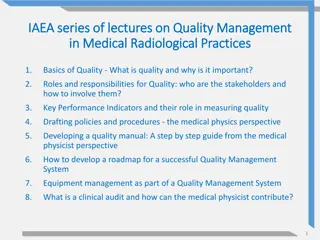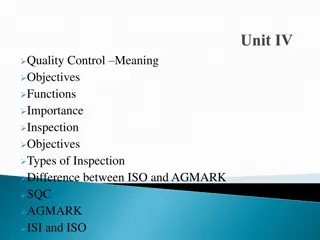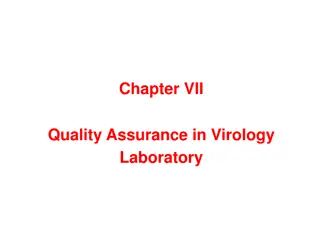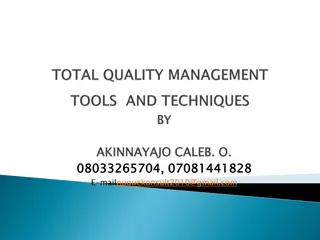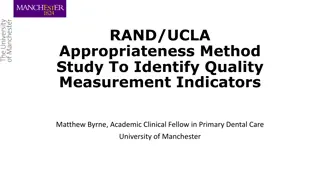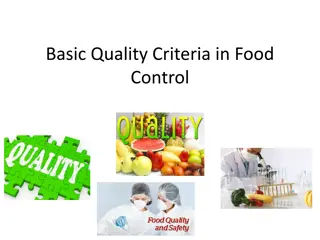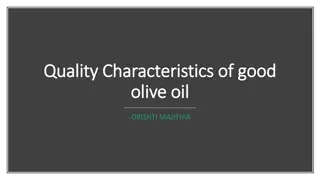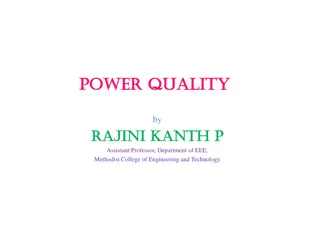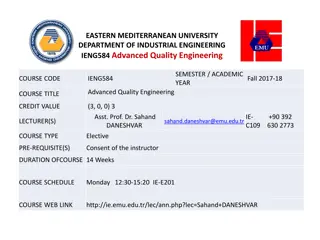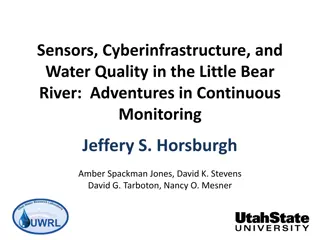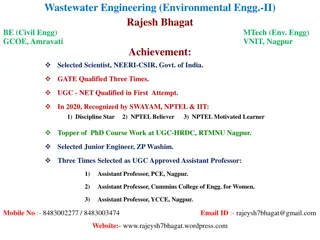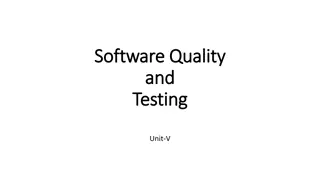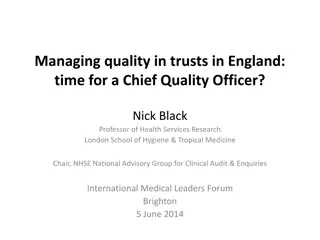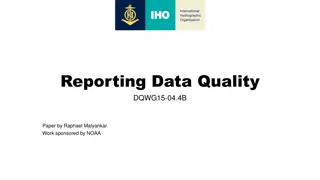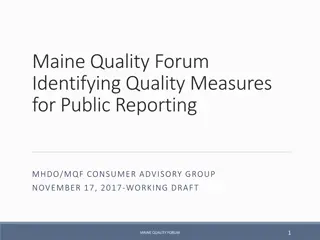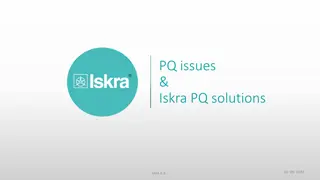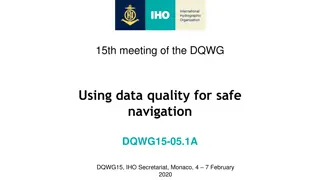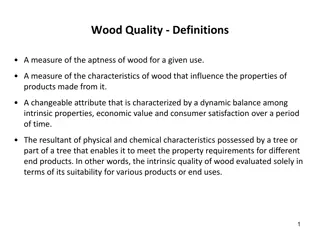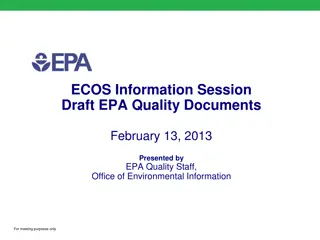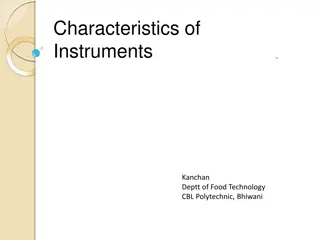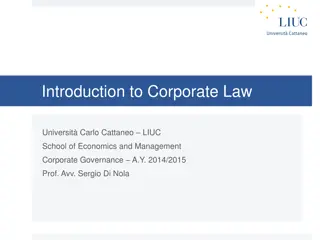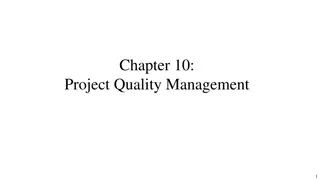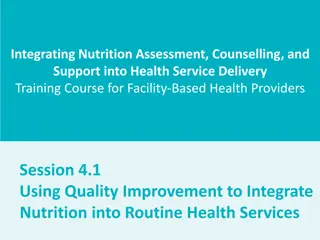Development of new quality assurance guidelines for online learning
Explore the development of new quality assurance guidelines for online learning, the role of Quality and Qualifications Ireland in maintaining national qualifications, and the principles and framework of quality assurance in Irish higher education institutions. Understand the continuous improvement
3 views • 29 slides
IAEA series of lectures on Quality Management in Medical Radiological Practices
Quality management in medical radiological practices is crucial for ensuring the delivery of high-quality healthcare services. This series of lectures covers topics such as the basics of quality, roles and responsibilities, key performance indicators, drafting policies, developing a quality manual,
4 views • 54 slides
Understanding ATIEL and European Engine Lubricants Quality Management
Introduction to ATIEL, a non-profit association representing leading European and international engine oil manufacturers. ATIEL focuses on promoting technical consensus, product stewardship, and sustainability to enhance engine oil performance. The association also delves into the development of qua
1 views • 29 slides
Understanding Quality Control: Meaning, Objectives, Functions, and Importance
Quality control is a crucial process where management ensures products meet predetermined standards. It involves assessing quality, locating deviations, suggesting improvements, and reducing wastage. Inspection is essential for verifying product quality and quantity. Maintenance of quality, cost red
2 views • 14 slides
Understanding Reach Characteristics in HEC-HMS Basin Modeling
Reach characteristics play a crucial role in hydrological modeling using HEC-HMS. Georeferenced reaches are essential for computing reach characteristics like slope, sinuosity, relief, and more. The process involves pre-processing drainage data before detailed reach characteristics can be obtained.
0 views • 5 slides
Quality Assurance in Virology Laboratory
This chapter focuses on quality assurance in virology laboratory, covering topics such as quality control, documentation of test results, laboratory safety rules, and more. It explains the types of quality control, quality assurance cycle, and process areas of quality assurance in laboratory testing
3 views • 19 slides
Understanding the Differences and Characteristics of BJT and FET in Electronics
Learn about the disparities between Bipolar Junction Transistors (BJT) and Field-Effect Transistors (FET) in this informative content. Explore the construction, operation, and characteristics of these semiconductor devices, including N-channel JFET specifics, operating behaviors such as pinch-off, d
2 views • 9 slides
Total Quality Management (TQM) in Organizations: A Comprehensive Overview
Total Quality Management (TQM) is a system approach that enhances quality and productivity in organizations through methods like CQI, SQC, QFD, QIDW, and TQC. TQM emphasizes quality, teamwork, and proactive management philosophies, aiming to continually improve products and services. Key elements in
0 views • 14 slides
Study on Identifying Quality Measurement Indicators in Primary Dental Care
This study by Matthew Byrne, an Academic Clinical Fellow at the University of Manchester, focuses on identifying quality measurement indicators for primary dental care. The aims include gaining consensus on important quality dimensions, assessing available quality measures, and identifying areas for
1 views • 12 slides
Understanding Basic Quality Criteria in Food Control
Food quality is defined by a combination of attributes that determine the acceptability of a product to consumers. It encompasses purity, strength, physicochemical characteristics, and more. Quality is a measure of excellence and acceptability by consumers, emphasizing satisfaction of needs and conf
0 views • 33 slides
Quality Program and Process in Manufactured Construction
The module explores quality management in manufactured construction, covering concepts, history, standards, control programs, defects, and more. Emphasizing the importance of quality in the construction process, it discusses the evolution of quality in manufacturing and its application in the manufa
0 views • 40 slides
Understanding Quality Characteristics of Good Olive Oil
Discover the essential quality characteristics of good olive oil, including factors affecting its quality, basic composition, and parameters influencing its overall acceptability. Learn about the importance of attributes such as free fatty acidity, peroxide value, and sensory scores in determining o
5 views • 12 slides
Comprehensive Overview of Quality Control in Blood Bank and Quality Assurance
In this detailed content piece, we delve into the realms of quality control and assurance in blood banks, emphasizing the crucial aspects such as quality system essentials, internal and external quality control procedures, and the significance of quality assurance in ensuring products meet required
0 views • 46 slides
Understanding Power Quality and Its Impact on Electrical Systems
Power quality refers to the characteristics of electrical power that drives sensitive equipment. It involves voltage and current deviations from ideal waveforms, impacting the efficiency and reliability of electrical systems. Various types of power quality phenomena exist, such as voltage variations
1 views • 16 slides
Advanced Quality Engineering Course at Eastern Mediterranean University
The Advanced Quality Engineering course at Eastern Mediterranean University covers topics such as statistical process control, control charts, quality improvement, experimental design, acceptance sampling, and more. Students will explore various quality characteristics, CTQ parameters, and statistic
0 views • 10 slides
Continuous Monitoring of Water Quality in Little Bear River
Explore the implementation of sensors, cyberinfrastructure, and continuous monitoring networks in the Little Bear River to improve water quality predictions. Discover the challenges and solutions related to designing monitoring networks, integrating optical measurements with water quality data, and
1 views • 38 slides
Understanding Wastewater Engineering: Characteristics, Treatment, and Standards
Wastewater engineering involves studying the characteristics of wastewater, such as its strength and composition, to design effective treatment systems. This field covers topics like conventional sewage treatment plants, types of wastewater based on strength, and effluent standards for disposal. Und
1 views • 54 slides
Transformation of Quality Assessment Framework in Healthcare
The healthcare quality assessment framework is evolving with a new strategy focused on data-led, people's experiences, care integration, and safety culture. The current framework is transitioning towards a new approach by late 2023, incorporating separate registration and monitoring processes, five
0 views • 14 slides
Understanding Quality of Life and Its Impact on Society
Quality of life is not just a concept but a way of living that influences our judgments, standards, and priorities. Quotes from notable figures emphasize the importance of setting high standards and valuing quality in all aspects of life. The discussion delves into different perspectives on quality
0 views • 16 slides
Understanding Software Quality and Testing in Modern Development
Software quality is a multifaceted concept that can be viewed from various perspectives, such as transcendental, user, manufacturer, product, and value-based views. In software development, quality of design and conformance play vital roles in creating a useful product that meets user needs and expe
0 views • 40 slides
Understanding Total Quality Management (TQM) and Dimensions of Quality
Total Quality Management (TQM) is customer-oriented, aiming to achieve customer delight through systematic quality improvements. Quality, defined by experts like Juran and ISO, focuses on fitness for use and meeting customer needs. The concept includes dimensions like Product Quality (Functionality,
0 views • 30 slides
Enhancing Audit Quality and Impact with ISSAI 140
Importance of audit quality for credibility, stakeholder confidence, and overall impact. Objective of SAIs to implement quality management system like ISSAI 140. Steps to implement ISSAI 140, organizational requirements, risk assessment, governance, and leadership responsibilities. Overview of quali
0 views • 12 slides
The Importance of a Chief Quality Officer in Healthcare Trusts
The need for a Chief Quality Officer (CQO) in healthcare trusts in England is emphasized due to the complexities of managing quality, the significance of quality alongside finance, and the call for a new approach to address quality issues. The CQO plays a crucial role in overseeing and improving qua
0 views • 11 slides
Data Quality Reporting in Distribution Chain
Data Quality Reporting in the distribution chain is crucial for evaluating and ensuring the quality of exchanged data sets. This paper by Raphael Malyankar sponsored by NOAA discusses the importance of reporting data quality results, the stages in the production/distribution chain where reporting is
0 views • 15 slides
Quality Measures in Healthcare: Maine Quality Forum Initiatives
Maine Quality Forum (MQF) collaborates with various healthcare stakeholders to provide comparative health care quality information to consumers, purchasers, providers, insurers, and policy makers. The forum focuses on reporting provider-specific quality measures, aligning with the Institute of Medic
0 views • 12 slides
Quality Management and Safety in Project Delivery
Quality management and safety are crucial aspects of project delivery, ensuring that projects meet or exceed client requirements. Quality encompasses factors such as longevity, needs fulfillment, cost-effectiveness, usability, security, and efficiency. Essential elements of quality include performan
0 views • 53 slides
Power Quality Monitoring and Evaluation in Modern Energy Systems
Power quality is crucial for stable operations in energy systems. This content discusses issues in power supply, reasons for measuring power quality, consequences of bad power quality, methods for measuring power quality, and evaluation techniques for compliance reports. Tracking power quality param
0 views • 21 slides
Enhancing Safety in Navigation Through Improved Data Quality Visualization
The IHO Data Quality Working Group focuses on classifying and depicting the quality of digital hydrographic information to ensure safe navigation. The group addresses the need for clear warnings on ECDIS displays regarding poor-quality survey data. Despite progress in developing visualization method
0 views • 34 slides
Understanding Wood Quality: Definitions and Influencing Factors
Wood quality refers to the characteristics of wood that determine its suitability for various uses, influenced by factors such as tree growth, forestry management options, and technical performance. Foresters focus on tree growth characteristics like density, strength, and grain direction to cultiva
0 views • 6 slides
Enhancing Quality Assurance Practices in EPA Documents
This information session by EPA Quality Staff on February 13, 2013, focuses on proposing a Quality Standard for external organizations. It emphasizes the importance of quality assurance in decision-making processes and the benefits of documenting QA procedures. The session also introduces the concep
0 views • 20 slides
Proposal to Update New Mexico Water Quality Standards: Copper Site-Specific Water Quality Criteria for the Pajarito Plateau
Develop a proposal for the New Mexico Water Quality Control Commission to adopt EPA's 2007 recommended copper ambient water quality criteria, focusing on the history of U.S. EPA aquatic life criteria for copper, the use of the BLM tool in aquatic toxicology, and the overview of proposed site-specifi
0 views • 10 slides
Importance of Quality Assurance Programmes in Population Censuses
Quality assurance programmes play a crucial role in ensuring the accuracy and reliability of census data. These programmes help in identifying and rectifying errors at various stages of the census process, ultimately leading to high-quality outcomes that are valuable for data users. Emphasizing on t
0 views • 26 slides
Understanding Characteristics of Instruments in Food Technology
Exploring the static and dynamic characteristics of instruments in the field of Food Technology is crucial for accurate measurements. Static characteristics include stability, range, accuracy, sensitivity, reproducibility, hysteresis, precision, and more. On the other hand, dynamic characteristics f
0 views • 32 slides
Understanding Water Quality Parameters and Characteristics
Water quality encompasses physical, chemical, and biological characteristics that determine its suitability for various uses. Physical parameters like turbidity, taste, odor, color, and temperature affect sensory perception. Chemical parameters such as pH, acidity, alkalinity, and hardness relate to
0 views • 26 slides
Leadership Engagement for Quality Transformation in Medical Device Companies
Move from a culture of compliance to quality by influencing CEOs and key leaders, prioritizing quality over cost, and engaging employees. The mission is to promote quality as a strategic priority through strong leadership and alignment. Strategies include identifying and rationalizing cultural pract
0 views • 9 slides
Understanding the Core Structural Characteristics of a Business Corporation
The common structure of business corporations involves five key characteristics: legal personality, limited liability, transferable shares, delegated management under a board structure, and investor ownership. These characteristics are present in economically significant jurisdictions and cater to t
0 views • 35 slides
Understanding Project Quality Management
Project Quality Management involves processes such as quality planning, assurance, and control to ensure that a project meets the relevant quality standards. It encompasses activities like identifying quality standards, evaluating project performance, and monitoring results to improve overall qualit
0 views • 65 slides
Quality Assurance/Quality Control of Real-Time Oceanographic Data: Five-Year Plan Update 2022-2026
Update on the Quality Assurance/Quality Control plan for real-time oceanographic data, presented by Mark Bushnell at the US IOOS/QARTOD DMAC Annual Meeting in June 2022. The presentation covers the focus on real-time quality control manuals, the Seven Laws of QARTOD established in 2003, and the invo
0 views • 15 slides
Integrating Nutrition Assessment and Counseling: Quality Improvement in Health Services
This training course focuses on integrating nutrition assessment, counseling, and support into routine health services using quality improvement methods. Participants will learn to explain the concept of quality improvement, develop a plan for integrating nutrition services, and understand key princ
0 views • 32 slides
Mobilising for Quality Education: A Global Initiative for Ensuring Quality Teaching and Learning
Mobilising for Quality Education is an international initiative that emphasizes the importance of quality education for individual development and societal progress. The initiative focuses on three pillars of quality education: quality teaching, tools for teaching and learning, and environments for
0 views • 13 slides

